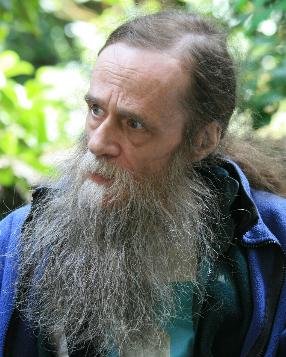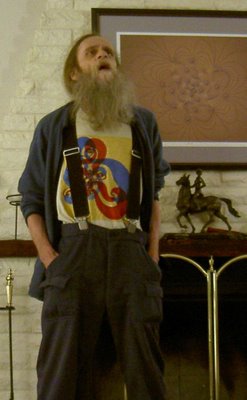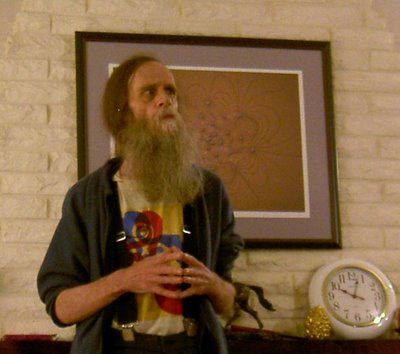This article, "The Dismal Science", is a preliminary personal exploration of economics. I make no pretense that I know much about contemporary economic theory. I've tried to get into it a number of times but have always been repelled by (what is to me) the obvious idiocy of the economic thinking that I've encountered.
I see this as a paradigm problem. The ideas that make up the paradigm of mainstream economics just don't survive in the ecosystem of my mind, because they get attacked and destroyed, perhaps before I fully understand them.
It is obvious to me that I have my own understanding of economics - my own paradigm if you will - and that it is this paradigm that is blocking my acceptance of mainstream economic theory. But my own internal paradigm has never been brought fully into consciousness. While I hope that my paradigm is coherent, I must say in all honesty that I have never articulated it in a way that is complete enough to tell. I've decided to attempt that articulation.
Reading Thomas Kuhn has led me to believe that any paradigm, conscientiously explored, is better than no paradigm. One learns more by being clear, even if mistaken, than by being muddled. This exploration is an attempt to be clear enough that my mistakes will be obvious.
The Dismal Science
Economics has been called the "Dismal Science." My dictionary says that "dismal" means "gloomy, dreary, depressing, bleak." This definition certainly resonates at this time, at least here in British Columbia; it is getting harder and harder to make a living, and the provincial government is busily making it even harder. At every turn, when you seek answers to why this is happening -- the paraphrased answer is "Economics."
Personally, I think it a mistake to call Economics a dismal science because I don't think that it is a science, any more than theology is a science. In economics, as in theology, the central truth is assumed to be true (not demonstrated) and the whole conversation is dedicated to exploring the implications of that assumed truth and to various convoluted apologia whose purpose is to make the assumed truth seem more reasonable.
The Great Balance Sheet
In Economics, I think that the assumed truth is that an economy can be described by something like a balance sheet. This, it seems to me, is a result of the fact that economics has been concerned with money. Before things can even be thought of in economic terms, those things must have money values assigned to them. Once the money value is assigned then the thing can take its place as a number in the Great Balance Sheet.
If we ask the question "what is the proper money value of a thing?" we immediately confront the flaw in the balance sheet idea. The balance sheet is meaningless unless money values can be assigned, and the balance sheet takes on different states according to the actual money values assigned. Therefore the valuation of things determines crucially the information that a balance sheet provides.
Markets
I take it that the market is generally invoked as the means by which money value is assigned to things. In this context the market is seen as an external, objective reality beyond human control. The market is seen as automatically assigning values to things, in a way perhaps similar to the way that gravity naturally stratifies immiscible fluids of different densities within the same container. Just as no one tells the oil to float on water, supposedly no one fixes the price of a chocolate bar at a dollar -- it all just happens.
But with oil and water the relative densities are determined by physical details of atomic structure. There is no comparable physical fact that determines the value of a chocolate bar. What is the value of chocolate and peanuts? What is the value of the work that makes and distributes the chocolate bar?
Let's look at the value of chocolate. If I like chocolate, it has a high value -- if I don't like it, it has a low value. Thus, the effect of chocolate on the Great Balance Sheet depends on people's preferences. But how are preferences determined and measured? Supposedly, the market automatically and impersonally is affected by all the preferences and assigns a value for chocolate that reflects the average preference at any moment. The reason I say "supposedly" is that markets are obviously not affected by all preferences. Markets are only affected by those in a position to buy. The preferences of those who cannot buy are not, in general, influential on markets. Moreover, the preferences of those who buy a lot are much more influential than those who buy a little. Therefore it is clear that the money value that a market assigns to things is not determined by an average of all preferences, but by the preferences of a small subset of the population.
This seems very natural -- it is built into the logic of markets. It's only when we bring the assumed truth of economics, the Great Balance Sheet, into consciousness that the skewed valuation provided by markets is seen to be a problem. This is because the numbers that make the balance sheet meaningful are not really a true measure of value, but are instead just an assertion of the preferences of a small subset of a population. Thus the meaning that can be extracted from the Great Balance Sheet, presented as an objective representation of fact, is in fact a subtle but powerful promotion of the interests of those who are already rich against the interests of others with different needs and preferences. It is for this reason that economics, dismal as it may be, is nowhere near being a science. Of course a corollary of this is that the information provided by economics is not to be trusted.
I don't think that all markets are the same. Some do seem to provide a rational valuation. The market for chocolate bars would probably be a good example of this type. Due to wide voluntary participation in the market I'd bet that the selling price of chocolate bars is fairly directly linked to the costs of production and distribution, with a modest profit thrown in.
The valuation provided by some markets is determined more by issues of scarcity and popularity rather than by the cost of production. Most of the arts fall into this category. And while this may seem unjust to some, it does no great harm and makes a kind of sense. The labor market also falls into this category and in this case the result is not nearly so benign. Because the value of labor is not related to its costs, vast numbers of people are forced by their circumstances to sell their labor for less than the cost of their maintenance at a reasonable standard of living. This is what it means to be among the working poor. It is a hard cold fact that there are many people who cannot produce any value with their labour, and the labour market cannot provide any sustenance for such people. These are extremely serious issues about which the labour market has nothing to say.
The capital markets, that is the markets for stocks and bonds, are of a different type again. These are largely speculative markets driven by the desire to make money by means of financial manipulations rather than by production of any sort. Indeed, circumstances often arise where it is more profitable for the speculators to break up a productive resource than to maintain it. But more often this comes about because investment is not focussed on need but is rather driven by emotion and fear as the speculators seek to make something from nothing. Typically, the fact that speculators want something for nothing is disguised by the risks they take in their speculations. But the risk that speculators undertake is not a productive activity, even if it enables production. And -- let us not be blind -- speculation doesn't only enable production, it also inhibits production, because the reward to speculators in the form of interest and dividends is subtracted from the resources available for production as far as the Great Balance Sheet is concerned.
There is a certain irony here, for the speculators typically think of themselves as the source of wealth and production. Here is a quote from the Premier of British Columbia: "I'm surprised that they haven't figured out yet that it's private sector investment that actually generates the income that supports their jobs." I take a different view -- it is the work of people at their jobs that generates the wealth that private sector speculators rip off. When it comes right down to it, people at work are the only sources of wealth there are and it is this fundamental fact that the Great Balance Sheet makes invisible.
An interesting problem caused by the stock market arises because it causes productive entities to have two values -- the value of the company's assets minus its liabilities as its book value and the value of its stock to speculators as its stock value. Now apart from the fact that this double valuation further reinforces the idea that the Great Balance Sheet is not objectively meaningful, it is also very destructive. For instance, if speculative market forces cause the stock value to fall below its book value the company is vulnerable to being broken up by the speculators who hold its stock, even though the company is viable in other respects. When this happens it causes great harm and destruction. People lose their livelihoods and even if they regain it elsewhere later, the interval is still a time of loss, stress and suffering -- a price that they must pay so that speculators may profit. The very significant thing is that the suffering of such people never makes it onto the Great Balance Sheet and as far as economics is concerned is of no importance at all. To add insult to injury, economic theory seems to present such destruction as a positive thing -- a clearing out of deadwood that makes the economy more efficient -- as if the people involved were so much garbage.
Conclusion
So, the idea of the Great Balance Sheet causes a double distortion of our perception of economic reality. First it doesn't register non-monetary values, either positive or negative. Things like suffering caused by economic disruption don't get included in the conversation that the Great Balance Sheet informs. Neither do positive values, like (say) the satisfaction that people feel when they are secure, get entered into the Great Balance Sheet. Instead, these non-monetary values are used as the carrot and stick that causes most people to jump to the speculator's tune. The second distortion is that speculators, and it seems economists, tend to look at those who work in production as parasites -- a drain on wealth rather than as the source of wealth that they are. (See the quote from BC's Premier above.) This is extremely ironic of course, for the speculators really are parasitic.
I have a negative attitude about speculators. Perhaps it's obvious. I must qualify my negativity. First, and most important, I don't mean it personally. On a personal level, speculators are people who, for one reason or another, have a pool of value that is in excess to their needs that they are willing to let others use. Often enough, on a personal level, the hope of profit isn't the only or main reason why that value is made available. And often the pool of values that speculators possess was gathered by sacrifice and valuable work for which they had the good fortune to be rewarded. I do think that speculation is a bad social institution, but I also think that individual speculators must be seen as good or bad according to their circumstances, not because of their social role.
A second important point is to acknowledge the supreme importance of the existence of pools of capital and also to acknowledge the historic fact that speculation has been the primary and most effective way of accumulating such pools. Some would say therefore, that far from being negative, speculation is a positive boon that has brought us prosperity and freedom. I take a different view. It is clear to me that the potential benefits of pools of capital are not realized due to the wastage and ill-focused decision making that is characteristic of the speculative system. The best that can be said of speculation is that it serves as a bootstrap mechanism allowing pools of capital to form in the first place, but I believe that now that same mechanism has become an albatross around our collective neck, restricting our progress and driving us down dangerous paths.
If we have no speculators, what other system would accumulate pools of capital? This is a good question, the kind of question I'd hoped this paper would turn up, and a question for which I have no ready answer, yet.
Other good questions
Who or what should control the pools of capital. This is very vital. On the one hand, how do we ensure competent management so that the valuable pools are not frittered away? On the other hand, how do we prevent the controllers of those pools from turning into dictators if we discard the present anarchic system of many competing speculators?
In closing, what is the assumed idea upon which my own paradigm is based? What is it that I offer as a substitute for the Great Balance Sheet? I don't think that accounting, or even money, is what economics should be about. As a species, we have a task. That task is, bluntly, to support ourselves in the manner that we think fitting. The way we support ourselves is by working to extract the materials we need from our environment and by working to transform those materials into things that are useful to us. I think that economics is the study of how we support ourselves, how we propose to accomplish our great task.
Of course there are many different ways that we can support ourselves. We can set the task so that we are all subsistence farmers or we can set the task so that we are all participants in an industrial society. I don't think the choice of task we undertake is a matter of economics, it is more a matter of philosophy and ethics.
 by Martin Hunt
by Martin Hunt


















